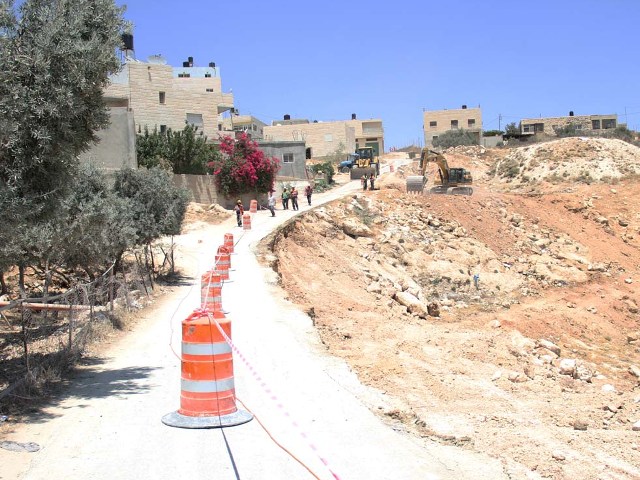Road rehabilitation in Judea and Samaria
-
-
6/24/2013
GovXShortDescription
Three road rehabilitation projects are under way - COGAT and USAID are cooperating in order to jointly repair dangerous roads and optimize the traffic system of the Judea and Samaria region.
-
-

 Road rehabilitation in Judea and Samaria
Copyright: COGAT
Road rehabilitation in Judea and Samaria
Copyright: COGAT
|
GovXContentSection
(Communicated by COGAT - Coordinator of Government Activities in the Territories)
Last Thursday (June 20th), the Jerusalem Envelope DCL and USAID's contractor company went on a joint tour of three locations within the Jerusalem Envelope Sector, where USAID funded road rehabilitation projects are currently being carried out. The goal of that tour was to estimate the progress of each project, in order to grasp the extent of the assistance required from the Civil Administration in Judea and Samaria.
The work on the three projects began last month at three major routes: Kalandia-Jeba, Keidar, and Swahahra Sheikh Ba'id. These are narrow and dangerous roads serving large populations, which caused many traffic accidents and limited traffic. For some, these roads are the only access to the village or region where they live. An example of the extent of risk posed by these roads is the traffic accident that occurred on the Kalandia-Jeba corridor in February 2012. This serious accident claimed the lives of 8 people and approximately 50 people were injured, after the bus that transported Palestinian children collided with an Israeli truck and flipped over.
The immediate need for road rehabilitation arose following the understanding that these routes endanger the lives of the local population and pose difficulties to their free movement. Within the scope of the projects, three roads will be improved and broadened, with lanes added to become safe, two-way roads. The overall cost for the three projects totals $10 million, funded by USAID, with the coordination and assistance of the Civil Administration. "Road rehabilitation shall provide safety, convenience and free access," says Muhammad Jaradat, Senior Engineer at APRO ARCON, a contractor company working with USAID. "Now it will be possible to travel easily and safely on those roads, positively influencing the way of life of the people living in the area."
The three road rehabilitation projects were approved two years ago but were frozen following US budgetary difficulties. Since President Obama's recent March visit, USAID's budget has been renewed and work has begun. Thanks to the budget renewal, there has been a substantial increase in the extent of projects being carried out in the Judea and Samaria region. This year, a $100 million budget has been allocated for immediate projects, and a similar amount has been allocated for future projects.
Beyond the general increase in the extent of the projects, there has been a marked increase in road projects. 95% of applications for road rehabilitation were approved over the course of the last two years, and it is evident that this trend will continue also in the future. COGAT places special emphasis on road construction projects, because such projects, in addition to augmenting passenger safety, directly contribute to the economic development in Judea and Samaria, since those roads constitute an infrastructural route for commercial activity.
"The Civil Administration staffs are my partners. We work in cooperation on a daily basis, and I see ourselves as a single society that shares a common goal," explained Muhammad Jaradat his working relationship between with the DCL and the Civil Administration. "They respond to every request or application quickly and mindfully, and we promote together projects that make life easier for the population that lives in this region."
"We believe in promoting as many projects as possible, so as to enable a proper fabric of life for the Palestinian population," the Head of the Jerusalem Envelope DCL, Lieutenant Colonel Ofer Meital explains. "COGAT and the international organizations that invest in the sector share a common goal: our mutual guideline is to maintain the inhabitants' way of life. We shall do all we can in order to continue promoting similar enterprises."
-
-
-
-
-
-
-
-
-
-
-
-
-
-
-
-
-
-
-